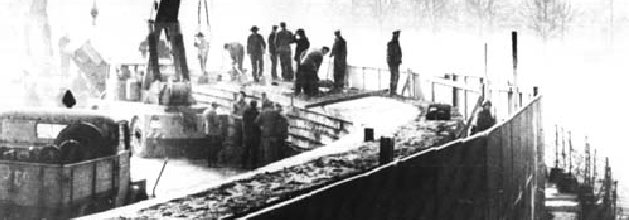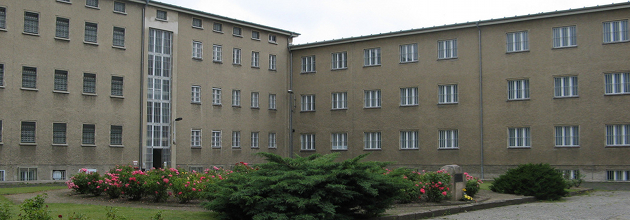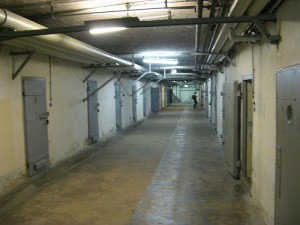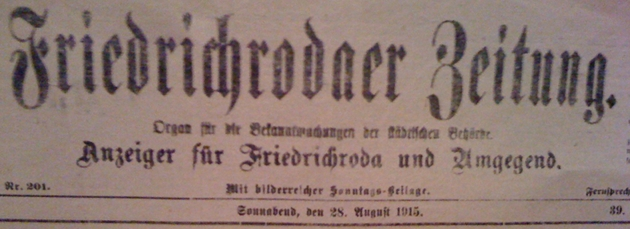The 70th anniversaries of the Nazi-Soviet Pact (agreed on 23 Aug 1939, signed early morning 24 Aug), the invasion by Nazi Germany of Poland (1 Sep 1939) and the invasion by Soviet Russia of Poland (17 Sep 1939), have given rise to spectacular happenings in the world of history and historians. The “spectacular” aspect of it all was kicked off when the Russian Defense Ministry published a paper denouncing the “falsification” of history committed by many historians in the West who damn the Soviets for their part in the Nazi-Soviet Pact. The publication of this paper seems to have been in line with Russian President Medvedev’s publicly-declared efforts to combat what he deems “severe, evil, and aggressive” falsifications of history. Then, earlier this month, the Russian Foreign Intelligence Service (SVR) released a statement which also defended the Nazi-Soviet Pact.
The Russian arguments concerning the Pact and the outbreak of war seem (to me) to go like this:
- The Second World War began because Poland did not accede to justifiable German demands, namely the incorporation of the very German city of Danzig (Gdansk) into the Reich and transit routes — under German control — to East Prussia.
- War between the Soviets and Nazis was inevitable, therefore Stalin had to do everything he could to put a buffer zone between the German military and the Russian border. This buffer zone would be the Baltic States and the regions of Poland which thereafter came under Soviet control.
- The West, particularly Britain, pushed the Soviets into this position of needing to make a Pact with Germany by a) its (the West’s) failure to enter into defense agreements with the Soviets; b) by the example set in Munich regarding Czechoslovakia the year before; and c) by siding with Poland in its refusal to accede to justifiable German demands.
You can well imagine that many people in Poland are paying attention to these contemporary interpretations which make the 1939 devastation of Poland both inevitable and the fault of the devastated. On Thursday (28 Aug 2009) things went one step further, as a Russian historian branded Poland an ally of Nazi Germany between the months of March and August of 1939. This was too much for Wacław Radziwinowicz, who calls out the Russian historian, Natalia Narochnitskaya, in an article titled (sarcastically) “How we became Hitler’s allies” in the English version of Gazeta Wyborcza:
This time of the role of the recon historian was played by Natalia Narochnitskaya, member of the presidential Committee Against Historical Distortions Harmful to Russia.
Ms Narochnitskaya is a very professional force. Her day job is running the Institute of Democracy and Cooperation, which for the Kremlin’s money monitors the state of democracy in the West. So she is an experienced soldier of the ideological front, baptised by fire in positions deep in enemy territory.
Yesterday, the readers of Komsomolskaya Pravda found in the tabloid an interview in which Ms Narochnitskaya exposed the historical truth, praising Stalin for ‘revising’ Hitler’s ‘timetable of war.’ According to her, Poland in 1939 between March and August secretly conspired with Hitler against the Soviet Union.
‘There are documents which prove that the date of the invasion of Poland was set on 1 March 1939. And do you know what the Poles did for the next half-year?’ asks Ms Narochnitskaya. And she answers herself, ‘The Russophobe foreign minister Józef Beck negotiated with Hitler to become his ally, offering assistance in invading Ukraine so that Poland could stretch from a sea to a sea.’ [my emphasis]
(Komsomolskaya Pravda, by the way, is described in its Wikipedia entry as belonging to Gazprom. Gazprom is the enormous Russian natural gas company controlled by the State, which occasionally uses it to influence events in Europe by threatening to cutoff natural gas supplies.)
Narochnitskaya’s interpretation of events might simply seem silly to some, but a Pole such as Radziwinowicz cannot be blamed for seeing it as sinister:
I also have no doubts that it is the state propaganda that is feeding Russians today with hatred and contempt towards Poles, just as it has previously done towards Estonians, Latvians, Lithuanians, Ukrainians or Georgians. People like Ms Narochnitskaya attack us in newspapers and TV stations where every single word is closely controlled by the Kremlin. Working in Moscow, meeting people here, I feel on my own skin how hostility towards Poles is growing.
I really recommend you read the complete text of Radziwinowicz’s column. In the meantime, however, I want to bring up another event that added to the spectacular nature of these historical debates. On 20 August 2009, a group of over 130 German historians issued a declaration which ties together the 1939 and 1989 anniversaries being commemorated this year. (1989 references the Fall of the Berlin Wall.) The declaration openly blames Germany for the start of the war, but does not mince words when it comes to its assessment of the Soviet impact on Europe in the following years. It describes the Hitler-Stalin Pact as “ruinous” and does not grant the Soviets any kind of excuse based on, for example, the idea of the inevitability of war with Germany. Instead, the Pact “divid[ed] up the Baltic states, Poland, Finland and Romania between the two totalitarian dictatorships.” And both dictatorships’ invasions of Poland are mentioned in the same breath: “The attack on Poland by Germany and the Soviet Union in September 1939 marked the beginning of an unprecedented war of conquest and extermination…” The historians rightfully follow-up by emphasizing’s Germany’s guilt during the war, but they then emphasize the Soviets’ post-war dicatorships:
After Europe and Germany had been liberated from the Nazis/National Socialism, people in all the countries of Europe were hoping for a future in freedom and democracy. But these hopes were bitterly disappointed for many. The Soviet Union enforced new dictatorial regimes in the central and eastern European countries and in part of Germany – all of which had been weakened by the War and by Nazi rule – with devastating consequences for the societies, the economy and culture, and for countless people who were persecuted as political opponents or lost their lives because they stood in the way of those in power. Thus, the Germans not only bear a heavy responsibility for the extermination of European Jews, the persecution and murder of Sinti and Roma, homosexuals, the disabled, people stigmatized as anti-social or political dissidents, and for the millions upon millions of people who were victims of the War. We are painfully aware that if Germany had not started the Second World War, there would have been neither the Communist dictatorships in central and eastern Europe, nor the partition of the continent and of Germany.
Extraordinary stuff, and I have to believe that the recent Russian revisionism played a role in getting these historians together for this declaration. An article in the Scotsman claims as much by stating that the German intellectuals “signed a declaration calling on Russia to condemn the ‘ill-fated pact’.” I don’t know if the author of that article refers to the same declaration. I don’t find anything in the declaration I’ve quoted above which directly calls on Russia to issue condemnations. But I can see why one might interpret that.
It’s worth considering Russia’s reasons for this revisionism. I think James Rodgers’ piece at the BBC, titled “Russia acts against ‘false’ history”, states the reasons rather well:
The country sees its victory over Hitler’s forces as the greatest moment of the 20th Century.
The war is sometimes discussed in the news media as if it were a recent event, not increasingly distant history.
Any attempt to tarnish the glory of that triumph is seen as a deliberate attempt to make Russia look bad.
That’s only a part of his explanation; I recommend you read the article in full.
As with most historical revisionism, the Russian position does not spring from pure fantasy. Historians such as Ms Narochnitskaya need to reference actual, documented evidence or they will simply be laughed off and ignored as kooks. Narochnitskaya, as we saw above, highlights what she considers Polish complicity with Nazi Germany. The Poles and the Germans did, in fact, sign a non-aggression treaty, an event which Stalin most likely looked upon with disfavor. Here’s Alan Bullock in Hitler: A Study in Tyranny (Amazon UK):
Yet the first country with which Hitler had signed a Pact of Non-Aggression had been Poland, and for five years he treated Poland in the friendliest fashion, despite the unpopularity of such a policy in Germany. [p. 491 of 2005 Penguin paperback]
There were indeed direct talks between Nazi Germany and Jozef Beck’s Poland during 1939, a fact which Narochnitskaya is quite pleased to use to her and Russia’s advantage. And it’s probably true that Beck listened to German ideas of a pact explicitly aimed at the Soviets; Beck — and Poland — had every reason to fear both Nazi Germany and Soviet Russia. But the fact is that Beck rebuffed the Nazis.
[Hitler’s openness to negotiations with Poland] was not altered after Beck’s reply to Hitler in his speech to the Polish Diet on 5 May [1939]. Rejecting Hitler’s account of the negotiations between Poland and Germany and reaffirming Poland’s determination not to agree to the German demands, Beck spoke of ‘various other hints made by representatives of the Reich Government which extended much further than the subjects of discussion. I reserve the right to return to this matter if necessary.’ This covert reference to suggestions of a joint German-Polish front against Russia, and Beck’s declaration that peace could be bought too dearly, if it was at the price of national honour, did not, however, stir Hitler to reply. [Bullock 505]
Beck himself made the cover of TIME Magazine’s March 6, 1939 issue. The accompanying TIME article about Jozef Beck makes for very interesting historical reading, considering it is only a matter of months before the Hitler-Stalin Pact and the start of the War. TIME plays up Beck’s wheeling and dealing ways. We see a Beck who is willing to discuss matters with any European government. He visits Hitler at Berchtesgaden but also reaffirms non-aggression with the Soviets. He even discusses territorial and colonial ambitions with the Italians, as shown in this rather unflattering bit:
Some diplomatic correspondents even reported that Italy was ready to cut Poland in for some of France’s colonies, probably Madagascar, where anti-Semitic Poland might send some of her 3,200,000 Jews, which she wants no more than Germany wants hers. [p. 2 of the TIME article]
On the one hand, the TIME article emphasizes Poland’s precarious position between its giant neighbors; on the other hand, the article does not exactly present the Poles as victims. Beck comes across as a rather cynical realist.
But surely we can’t compare Beck’s cynicism with Stalin’s. By Bullock’s telling, it was actually Stalin who insisted on the “Secret Protocols” that were attached to the Molotov-Ribbentrop agreement:
The pact itself presented no difficulties: Hitler had already accepted Molotov’s draft. But the Russians had added a postscript to the text: ‘The present pact shall be valid only if a special protocol is signed simultaneously covering the points in which the High Contracting Parties are interested in the field of foreign policy.’
To put it in crude terms, the Soviet Government did not propose to sign until it learned what its share of the spoils was going to be, and how Eastern Europe was to be parceled up. It was to complete this process of horse-trading that Ribbentrop was now to fly to Moscow. [524-525]
…
The evening appears to have been passed in the most cordial atmosphere. When toasts were drunk, ‘Herr Stalin spontaneously proposed a toast to the Führer: “I know how much the German nation loves its Führer; I should therefore like to drink his health.”‘ [530]
Bullock is quoting the German minutes of the discussion, which appear in the archives of the German Foreign Ministry. Presumably Ms Narochnitskaya also relies on such archives when she points out proof of Polish talks with Germany during 1939. Does she place equal emphasis on revelations such as these?
(Image credit: The lead image for this article is a blown-up portion of an image of the secret protocols attached to the Molotov-Ribbentrop Pact. The image was found at Wikimedia Commons and is in the public domain. The German title reads “Geheimes Zusatzprotokoll” [“Secret additional protocol”].)














